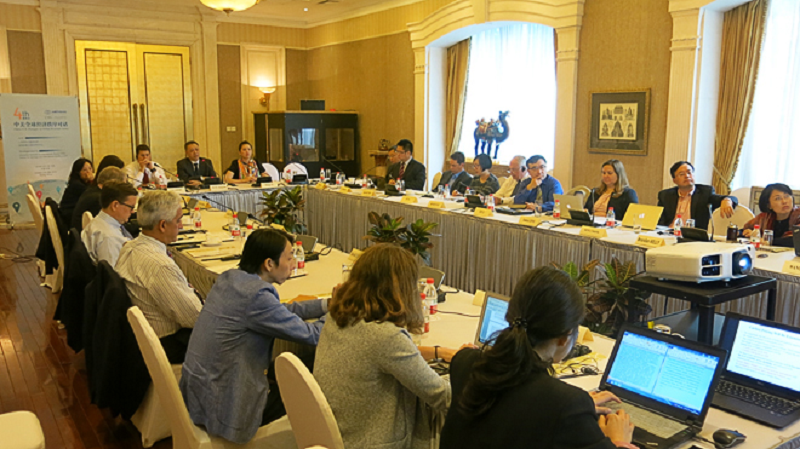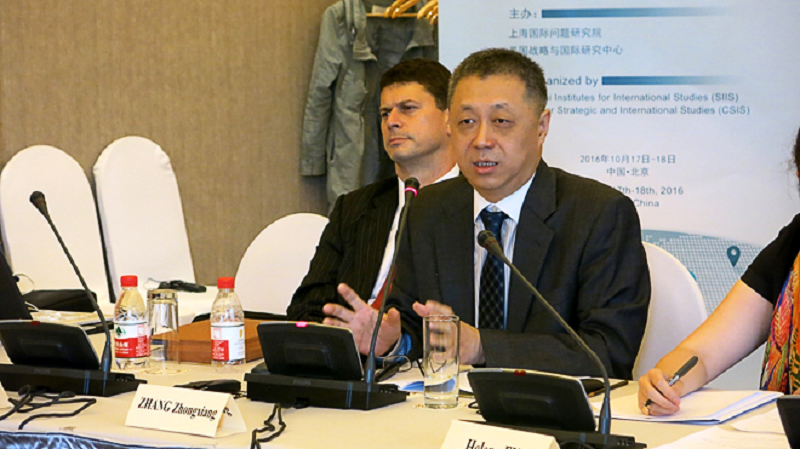

On October 17 and 18, 2016, the Fourth China-US High Level Dialogue on Global Economic Order was held at Kunlun Hotel and hosted by the Shanghai Institute of International Studies and the US Center for Strategic and International Studies. Professor Zhang Zhongxiang, a distinguished expert of the Thousand Talents Program from Tianjin University was invited to speak at the meeting for the second time, on "Overseas Energy Investment and Green Finance".
Professor Zhang Zhongxiang expressed his opinion on the different reform styles between China and US in the course of global governance: The US focuses on depth and concentration, while China emphasizes width and comprehensiveness. He also voiced his views on the points of argument between members of WTO, the losses and gains of China and suggested measures to amend the Information Technology Agreement and negotiations on environmental cargo and service trade.
Professor Zhang Zhongxiang pointed out that Chinese Government has come to realize it should devote public finances to the fields of energy and infrastructure toward environmental sustainability and social inclusiveness. China pledges to strengthen its policy on low-carbon and green development by exerting strict control over public investment in domestic and foreign programs with high contamination and carbon emission levels. The controlling limits to the policy depends on key factors including the definition of public investment and its application scope. For instance, what programs cannot accept public investment? What are the technical conditions for oversea coal-fired power plants to obtain public investment? Which kind of favored nations are listed as exceptions? Furthermore, it depends on whether the policy can be rigorously implemented. All these factors are expected to be explicitly addressed. China’s policy is relatively moderate and pragmatic due to its marketing system rather than the advocacy of a specific industry policy.
In the two-day meeting, representatives from China and the US in political, business and academic fields conducted deep discussion and communication around four issues: the coordination of macroeconomic policies, international trade, investment and climate. Based on the dialogue, they presented specific measures and suggestions to the US Government.
The representatives were: Matthew Goodman, the former coordinator of the White House APEC Summit and the East Asia APEC Summit, and Director of the Simon Political and Economic Program for the Center for Strategic and International Studies; Clay Lowery, former assistant minister sponsoring International Affairs of the U.S. Department of the Treasury, and former President of the Committee on Foreign Investment in the United States; Kevin Nealer, committee member of the Presidential Intelligence Advisory Committee; David Loevinger and Brendan Kelly, the U.S. Department of the Treasury’s first and current representatives in China; Helena Fu, Director of the United States Department of Energy, China Office; James Green, representative of the United States Trade Representative in Beijing; Scott Kennedy, Deputy Director of the Freeman China Project of the Center for Strategic and International Studies; Cao Wenlian, Director of the International Cooperation Center of the National Development and Reform Commission; Zhou Qiangwu, Director of the International Finance Center of the China Ministry of Finance; Chen Dongxiao, President of Shanghai Institute of International Studies; and over 30 representatives from the Ministry of Foreign Affairs, the Ministry of Commerce, the China Investment Corporation, the Chinese Academy of Social Sciences, Fudan University, the Albright Stonebridge Group, the Stimson Center, Looker Global Consultation and Georgetown University.